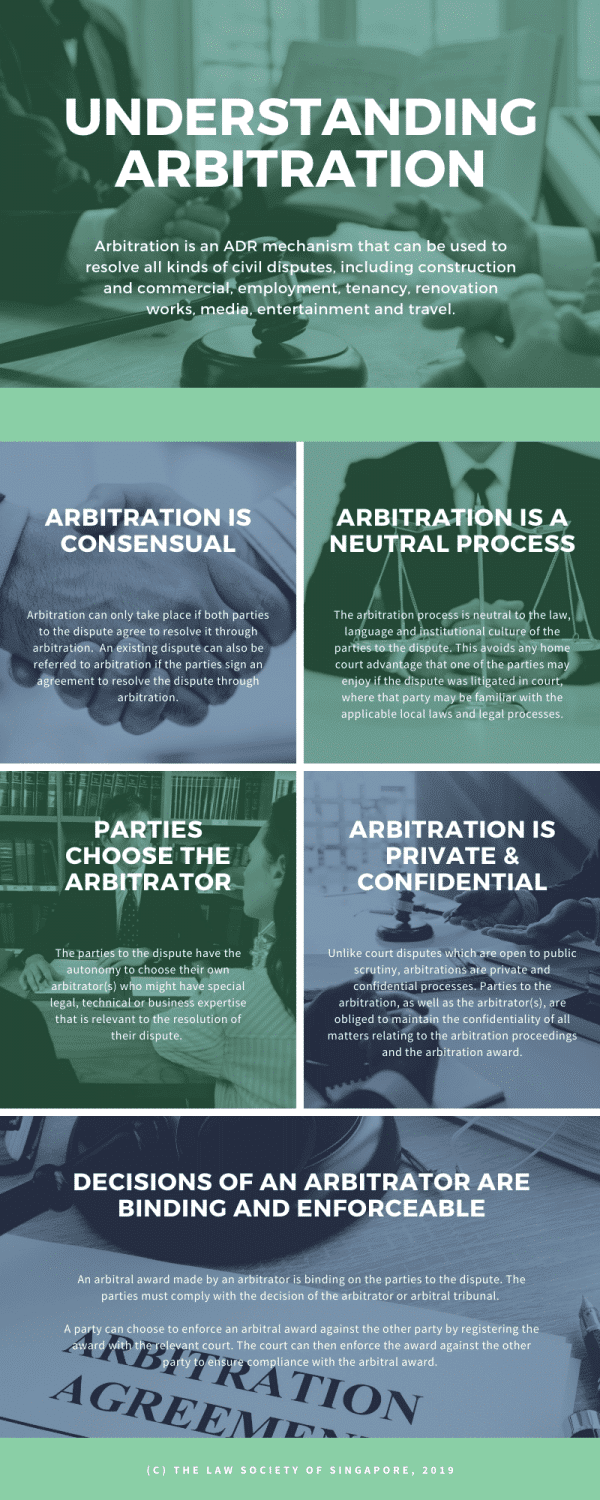Understanding Arbitration
The information in the Legal Fact Check Service is provided as a public service by the Law Society of Singapore. The information presented on this site is strictly for information. It is not legal advice and should not be treated as an alternative to seeking legal advice from your lawyer. The information provided in the Legal Fact Check Service is not a definitive analysis of the subject and professional legal advice should always be taken before any course of action is pursued.
Whilst the information presented is considered to be correct at the date of publication, changes in circumstances after the date of publication may impact on the accuracy of the information. The Law Society of Singapore reserves the right to amend any content at any time, at its sole discretion, without prior notice.
The Law Society of Singapore shall not be held liable for any damage or loss of any kind, howsoever caused as a result (direct or indirect) of the use of the Legal Fact Check Service, including but not limited to any damage or loss suffered as a result of reliance on the contents contained in or available from this site.
Understanding Arbitration
Arbitration is an alternative dispute resolution (‘ADR’) mechanism whereby the parties agree to submit their dispute to a neutral tribunal (comprising at least one arbitrator) to make a binding decision on the dispute. Through arbitration, the parties can resolve their dispute in a private and confidential manner instead of going to court.
Facts:
What types of disputes can be resolved through arbitration?
Arbitration can be used to resolve all kinds of civil disputes. Besides the traditional areas of arbitration such as construction and commercial disputes, arbitration can also resolve disputes in areas such as employment, tenancy, renovation works, media, entertainment and travel.
When may arbitration be appropriate for resolving a dispute?
When determining the appropriate means for resolving a dispute, here are some benefits of arbitration to consider:
| (a) | Arbitration is consensual: this means that arbitration can only take place if both parties to the dispute agree to resolve it through arbitration. An existing dispute can also be referred to arbitration if the parties sign an agreement to resolve the dispute through arbitration. |
| (b) | The arbitration process is neutral to the law, language and institutional culture of the parties to the dispute. This avoids any home court advantage that one of the parties may enjoy if the dispute were litigated in court, as there may be significant strategic advantages if either of the parties is familiar with the applicable local laws and legal processes. |
| (c) | The parties have the autonomy to choose their own arbitrator(s) who might have special legal, technical, or business expertise that is relevant to the resolution of their dispute. |
| (d) | Unlike court disputes which are open to public scrutiny, arbitrations are private and confidential processes. Parties to the arbitration, as well as the arbitrator(s), are obliged to maintain the confidentiality of all matters relating to the arbitration proceedings and the arbitral award. |
| (e) | An arbitral award made by an arbitrator is binding on the parties to the dispute. This means that the parties must comply with the decision of the arbitrator or arbitral tribunal. A party can choose to enforce an arbitral award against the other party by registering the award with the relevant court. The court can then enforce the award against the other party to ensure compliance with the arbitral award. |
The infographic below highlights the key characteristics of arbitration as an ADR mechanism.


